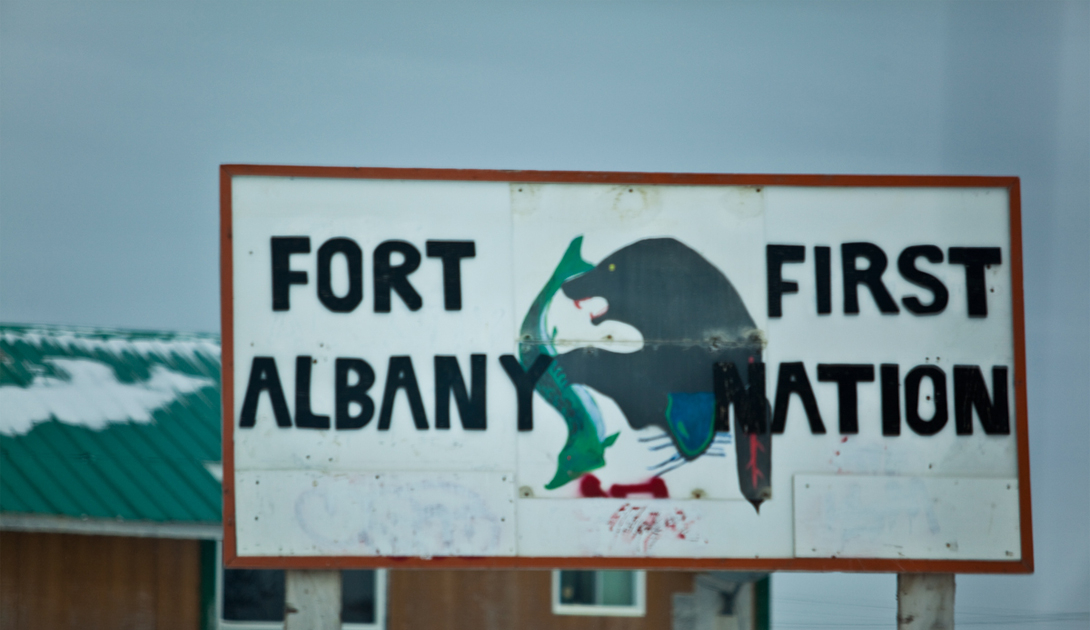Support strong Canadian climate journalism for 2025
The Fort Albany First Nation is calling for the Ontario government to repeal its omnibus economic recovery bill, saying it’s “deeply troubled” by the province’s failure to consult the public.
Fort Albany First Nation is a Mushkegowuk Cree community in northern Ontario, along the western shore of James Bay. It’s located near the Ring of Fire region, which the Progressive Conservative government has said it intends to develop into a mining hub despite opposition from Fort Albany and other Indigenous communities.
Bill 197 included changes to 20 laws, including rewrites that green advocates said would weaken environmental protections.
“We will fight it. How, we do not know yet,” said Fort Albany First Nation Chief Leo Metatawabin in an interview Monday.
“I understand economics is very important. I understand that. People depend on economics to survive. But we need the land to survive as well.”
Premier Doug Ford has said Bill 197 is aimed at helping the province speed up key infrastructure projects, which he says will help Ontario recover economically from the shutdowns caused by COVID-19.
It was passed last week over concerns from Ontario auditor general Bonnie Lysyk, who said the legislation was “not compliant” with public consultation requirements in Ontario’s Environmental Bill of Rights.
Passing the bill while Fort Albany First Nation is dealing with the impacts of COVID-19 is “taking advantage of the situation,” Metatawabin said. “It’s unjust.”
Lindsay Davidson, a spokesperson for Ontario Ministry of the Environment, Conservation and Parks, said in a statement that the government has held six webinars in the past two weeks to help Indigenous communities get up to speed about the changes in Bill 197. (He did not provide an answer when asked how many of them took place before the government passed the legislation.)
“Our government is committed to consulting with Indigenous communities prior to making a decision or taking action that could impact existing Aboriginal or treaty rights,” he said.

What is Bill 197?
Bill 197 included several significant rewrites of environmental rules.
It expanded the government’s power to override the normal land planning process and potential opposition to projects through ministerial zoning orders (or MZOs).
It also allows the province to decide which projects will undergo a full environmental assessment, which helps the government see what the impacts of a proposal could be. The government hasn’t yet outlined what types of projects will fall on that list, but has said it will focus its efforts on proposals that would have a higher impact on the environment.
Bill 197 removed a mechanism that allowed the public to request a full assessment of a project — now, it can only be used for issues involving existing Aboriginal and treaty rights.
The bill also included streamlined assessments for many types of projects. The changes didn’t define what the new streamlined reviews, called class environmental assessments, will look like, but posted several proposals for public feedback online.
The fact that the government left so many details out of the bill is concerning, Fort Albany First Nation said its statement. It’s also difficult for the nation to respond to the multiple proposals that are now open for consultation, the statement said.
“The government is unilaterally introducing major changes with the knowledge that our community is under pressure and constraints due to COVID-19, and that we do not have the resources or capacity to meaningfully engage,” the nation said.
“This is not honourable, and it disrespects our relationship with our territory and our role as a Treaty No. 9 partner.”
Metatawabin said the nation must understand and respond to proposals, often written in very technical language, with very minimal resources. They also need to translate documentation so elders can read and understand them. The nation is also about to undergo an election next month.
The nation also said the Ford government has a pattern of weakening environmental legislation, and that the government sees protections for endangered species and vulnerable ecosystems as “red tape.”
“We have watched this with alarm, as our muskeg homeland in northern Ontario is one of the main targets of this government’s economic agenda, particularly through the Ring of Fire,” the statement said.
“The muskeg is the foundation of our identity and culture. It is also one of the most important and delicate peatland ecosystems in the world, with a critical role in storing carbon that would otherwise accelerate climate change.”
Davidson did not address concerns about how the changes could impact development in the Ring of Fire, but said the bill enables public consultation. The streamlined environmental assessment processes will include consultation measures, he said, and the overall changes would reduce delays for agreements involving Indigenous communities.
“We advised communities that there will be additional opportunities for consultation in the future and have asked for their thoughts on how we can work together so their interests and perspectives can help inform the modernized environmental assessment program,” Davidson said.
“Now that the legislation is passed, the ministry will continue to consult with Indigenous communities as part of our efforts to modernize the environmental assessment program.”
Fort Albany First Nation said the government should repeal Bill 197 and redo its changes to environmental assessments — this time in consultation with Indigenous communities.
“It will alter the well-being of the environment and the land,” Metatawabin said of the bill.
“If you overlook (those things) and if you accelerate climate change, then it’s going to hinder our way of life. Not only us, but also all of the people down south… It’s going to cost lots.”






Comments